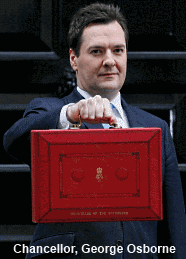|
|
|
|
|
|
|
News & Views item - June 2013 |
![]() Science Funding Anxiety in the UK. (June 12, 2013)
Science Funding Anxiety in the UK. (June 12, 2013)
 NatureNews'
Daniel Cressey reports that on June 26 Britain's Chancellor, George Osborne, "is
set to unveil the next comprehensive spending review (CSR), which sets spending
for government departments. He said that he hoped to make clear the government’s
'long-term commitment' to research in the new review, but scientists fear
another budget freeze."
NatureNews'
Daniel Cressey reports that on June 26 Britain's Chancellor, George Osborne, "is
set to unveil the next comprehensive spending review (CSR), which sets spending
for government departments. He said that he hoped to make clear the government’s
'long-term commitment' to research in the new review, but scientists fear
another budget freeze."
Nevertheless, Mr Osborne also stated that while he was not pre-empting the CSR: “You can read between the lines that I’m going to do everything I can to make sure Britain has a bright scientific future.”
Kieron Flanagan, a science-policy researcher at Manchester Business School. told Mr Cressey that although the CSR was for just the 2015-16 fiscal year: “You can do damage in one year” and noted that whoever wins the election in 2015 would be likely to work from the existing framework,
The anxiety of the sector is not mere paranoia: "Analysts are especially keen to know what the government will do with the ‘ring fence’ that was placed around the science budget in 2010, freezing it at £4.6 billion a year. The fence spared core spending areas — such as grants that are awarded by the country’s research councils — from the cuts inflicted on other public sectors, although the science budget still lost money in real terms each year. The umbrella group Universities UK has calculated that, when inflation is taken into account, the deficit is £600 million over the current four-year CSR period," Furthermore: "The 2010 CSR moved capital spending in science — monies allotted to large infrastructure projects such as buildings and facilities — outside the ring fence, away from the core science budget. That made infrastructure vulnerable to cuts, and projects such as the United Kingdom Infrared Telescope in Hawaii face closure as a result."
There is also the comment by the Chancellor that can be seen as subject to interpretation: “[T]he absolutely crucial thing is we fund basic scientific research — including basic scientific research in medicine — and I’m not prepared to do anything that puts that at risk”.
And finally James Wilsdon, a science-policy researcher at the University of Sussex, told Mr Cressey that another year of flat cash for science would be “painful but survivable”. Deeper cuts, he says, would be another matter.